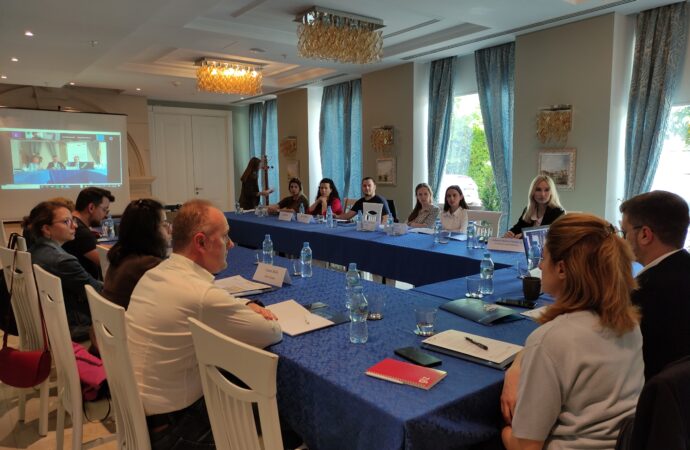The discussion table on informing and raising public awareness on food safety and consumer protection with a particular focus on the institutions responsible for implementation was organised on May 11, 2022. This activity was held within the project SANECA-Components of involvement of civil society, which is carried out by GIZ and EMA.
The Executive Director of EMA, Gledis Gjipali thanked the participants and highlighted that participation in this meeting goes beyond the membership of the Partnership Platform, given that the issue of standards and consumer protection involves a range of responsible institutions and important stakeholders.
Agim Rrapaj, Chairman of the Albanian Agribusiness Council and member of the EIPP roundtable on Chapter 28, spoke about the challenges of the agribusiness sector in Albania including production costs, certification, the role of public institutions in guaranteeing food quality. Starting with the agro-processing sector and the livestock sector Rrapaj highlighted that high production costs, extensive use of stimulants, unfair competition and informality are the main issues.
When it comes to fisheries and medicinal plants, Rrapaj pointed out that there are still some difficulties concerning the packaging process. Moreover, he talked about the relevance of public institutions in ensuring food safety, asserting that many of the responsible instances have not been digitised. Rrapaj used the recently founded Veterinary Agency as an example and added that business operators have high expectations from this entity. Participants expressed their interest to know more about exclusive rights and product patenting where Rrapaj mentioned financial issues and legislation gaps as the main obstacles for progress.
Granit Sokolaj, from Alert Centre, stated that the issue of food safety should become a national priority and said that we do not export products to European countries because these countries are sceptical when it comes to food safety. Rrapaj brought the example of mussel production, which is affected by previously created negative image and makes it impossible for Albanian operators to export this product to the European market.
Viera Baričičová, from the Ministry of Agriculture and rural development in Slovakia and NCEI expert, held a presentation on the institutional framework of food security in Slovakia before and after the integration of Slovakia in the European Union. In Slovakia the food safety law was created in 1995 and before 2002 inspections were merged into a single law. Baričičová introduced the participants with the main objectives of this law and added that its implementation improved with a new strategy of traceability. Lastly, Baričičová gave some recommendations for Albania, saying that it is important to establish a law as simple as possible according to the food safety. There should be clear division of competencies between institutions and it is important to prepare well-structured training plans.




















